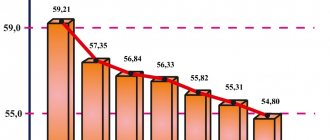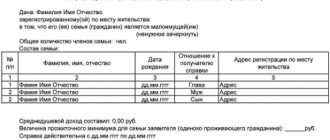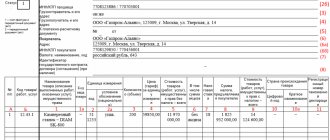The current Russian legislation dealing with the provision of housing space for citizens guarantees the provision of special opportunities to police officers and the Ministry of Internal Affairs for the purchase of housing. These guarantees allow police officers and the Ministry of Internal Affairs to use several options at their discretion, namely:
- Get a municipal apartment by concluding a social rental agreement (only for those who were on the waiting list before 2005);
- After issuing the appropriate certificate, receive monthly cash payments (MAP), which can subsequently be used to purchase an apartment or other housing;
- Get official housing (option for district police officers);
- A one-time payment, EDV or compensation from the state for the purchase of your own housing or construction of a house;
- Inclusion in the waiting list to provide police officers and the Ministry of Internal Affairs with housing in their personal property;
- Obtaining an apartment from the housing stock of the Ministry of Defense;
- Financial payment for rented housing (compensation).
Almost any of the listed options are available to a police officer, of course, if the required conditions and length of service allow them to be used.
Housing certificate
One of the most relevant ways for employees of the Ministry of Internal Affairs and the police to significantly improve their living conditions is to issue a housing certificate. It is a document giving the right to receive a specialized subsidy, which can be used only once in a lifetime and exclusively for the purchase or construction of one’s own home.
A housing certificate is awarded to persons whose work experience in the Ministry of Internal Affairs is at least ten years. The conditions also provide for the dismissal of police officers for health reasons or due to staff changes after they reach the maximum retirement age. Government decrees provide for the provision of a similar right to family members of police officers or other employees of the Ministry of Internal Affairs who died in the line of duty, if they were on the waiting list during their lifetime. In this case, it is worth taking into account such nuances as the submission of an appropriate application by family members of the deceased no later than one year after death, as well as the inability to use their right for widows who entered into a new official marriage before receiving housing. Such nuances must be taken into account in advance, before making decisions.
Obtaining a certificate
The conditions for obtaining the certificate specified above are as follows:
Dear readers!
Our articles talk about typical ways to resolve legal issues, but each case is unique. If you want to find out how to solve your specific problem, please contact the online consultant form on the right →
It's fast and free!
Or call us by phone (24/7):
If you want to find out how to solve your particular problem, call us by phone. It's fast and free!
+7 Moscow,
Moscow region
+7 Saint Petersburg,
Leningrad region
+7 Regions
(free call for all regions of Russia)
- The absence of a social tenancy agreement concluded at the time of submitting the application and the absence of personal housing or other residential real estate;
- If the family of a police officer of the Ministry of Internal Affairs lives in a municipal apartment, the area of which does not correspond to the established minimum per person. That is, the housing area should be less than fifteen square meters per person;
- Living with a chronically ill citizen whose illness poses a threat to the health of other residents;
- The fact of living in premises unsuitable for living;
- Accommodation in a hostel or communal apartment;
- Accommodation in a one-room apartment for two families.
Documents for obtaining a social certificate:
- Handwritten written statement;
- Applicant's personal passport;
- Extract from the personal account;
- Certificate from the house register;
- Certificate of marriage or divorce;
- Documents for children (birth, adoption certificates);
- Certificate of work experience in the Ministry of Internal Affairs, obtained at the place of work;
- Documentary evidence of the absence of real estate owned by the family of a police officer.
The corresponding request and the listed documents are submitted to the Ministry of Internal Affairs, which creates a specialized housing commission on these issues.
How to get a?
Certificates are issued in chronological order. The date of housing registration is important. The earlier an employee was put on the waiting list, the higher the chances of receiving a subsidy. However, the Ministry of Internal Affairs is constantly reducing funding. And if previously about 1,000 employees received certificates, now the number has been cut by half.
Where to contact?
Registration for the queue is carried out in the unit where the law enforcement officer serves. To get in line, you need to submit an application addressed to the head of the Ministry of Internal Affairs. You can get more information from the HR department or from the command staff. Pensioners and those dismissed from the Ministry of Internal Affairs must contact the unit where they served.
The report on inclusion in the queue and documents are submitted in the first half of the year. The earliest consideration of applications takes place from July-August. Therefore, employees of the Ministry of Internal Affairs need to send papers within the period from January 1 to July 1. This will give you a chance to join the queue starting in September. The next stage of registration is January next year.
How to get on the waiting list for housing?
So, if an applicant meets the requirements of the law and wants to receive a housing certificate, he needs to apply for its issue. Approximate procedure:
- Contact the housing department in the service area. Find out whether you meet the conditions, what documents are needed and whether benefits are issued in your region.
- Write a report (application) on the issuance of a housing certificate. Submit the accompanying documents and wait for the results.
- Convening an interdepartmental commission, making a decision.
- Notification of the applicant about his inclusion/non-inclusion in the list of waiting lists.
- Placing on a queue, establishing an accounting file. The Ministry of Internal Affairs officer will be given a personal number to track your place in line. The arrival of the queue is notified additionally by phone or mail.
How to use a housing certificate?
Happy certificate holders can use the subsidy and improve their living conditions. To do this, you need to adhere to the second algorithm of actions:
- Select a bank and open an IBC - registered blocked target account . A subsidy will be credited to the specified l/s, but it cannot be withdrawn.
- Find housing and negotiate with the seller. It makes more sense to work with a realtor - the agencies already have a database of apartments, and you can choose an option that suits you. In most cases, you will have to choose on the primary housing market. Not all regions allow the purchase of used apartments.
- Draw up a purchase and sale agreement, an acceptance certificate and a receipt for receipt of money - depending on the situation. Next, the DCT is registered with the MFC or Rosreestr.
- Submit information about the transaction to the bank where the account is opened. You also need to write a statement about the disposal of funds in a blocked account.
- Checking the purity of the transaction, submitting an application to the Treasury to transfer money to the IBC account. Final settlements with the seller, including using a mortgage loan (if issued).
- Report on the completed transaction in the service section.
It is very important to keep track of deadlines. The Ministry of Internal Affairs officer is given 90 days to transfer the certificate to the bank. If you do not meet these limits, the bank will not accept public housing projects. Then the subsidy will not be transferred, and the certificate will have to be returned back to the housing authority.
6 months are allotted for this . Upon expiration of the deadline, you need to report on transactions.
Required documents
The applicant needs to prepare not only an application, but also a package of documents. Sample list:
- application according to the provided sample + consent to the processing of personal data;
- ID card for an employee of the Ministry of Internal Affairs and his family;
- an extract from the Unified State Register of Real Estate or a certificate of ownership of housing;
- certificate of family composition, extract from the HOA or management company;
- ID of an employee of the Department of Internal Affairs, the Ministry of Emergency Situations, the Federal Penitentiary Service and other departments;
- certificate from place of employment – records length of service;
- an extract from the dismissal order, if the applicant is a pensioner of the Ministry of Internal Affairs;
- certificate of benefits;
- marriage/divorce certificate - depending on the situation;
- other documents.
Find out what certificates are needed in your case. Documents may vary by region. In addition, the department requests a number of certificates through its own channels.
The decision made
After submitting the documents to the housing commission, the request is considered within ten days and the necessary checks of the information provided are carried out. If no comments or inconsistencies are found, the commission will make a positive decision. When a request for a police officer is approved, the Ministry of Internal Affairs immediately opens a registration file.
It should be noted that the desired date for receiving the housing certificate, as well as the EDV, or if compensation is needed, the applicant should indicate in the application immediately. This is due to the fact that similar requests must be submitted in advance in order to receive help on time. Thus, a police officer has the right to apply one year before he needs a certificate. Based on such information, a queue of persons is formed for the issuance of certificates.
Of course, the commission can make a decision refusing to provide a social subsidy. This can happen if at least one document is missing, the right to improve living conditions was used earlier, or the applicant provided false information in the submitted papers. Once the reasons for refusal have been eliminated, the request is allowed to be submitted again.
When can a refusal occur?
The interested person may have his/her application rejected.
First of all, this may be due to the lack of documentary evidence of the fact that a person needs to improve their living conditions. For example, it will be established that he owns an apartment or house of the required size that meets technical and sanitary standards.
The reason for refusal may be the provision of false information about one’s position, concealment of the fact of owning or renting housing, overestimation of length of service, or falsification of health data.
They can refuse if a person has already received subsidies or enjoyed benefits, or is paying off a loan for purchased housing.
The requirement will not be satisfied if unauthorized persons apply, for example, those who are not children or relatives of the deceased, or a legal representative without a power of attorney.
Interested persons will lose the right to housing if more than twelve months have passed since the death of the Ministry of Internal Affairs employee.
Social payment on mortgage
Referring to the current Russian legislation, police officers in the Ministry of Internal Affairs are provided with another significant social benefit for purchasing an apartment or building a house.
This benefit is a subsidy accrued under the military mortgage program. However, regarding employees of the Ministry of Internal Affairs, it has some distinctive conditions. Federal laws regulate the provision of EDV from budget funds, which subsequently constitute a lump sum payment. It can be used to open or pay off a mortgage taken out for the purchase or construction of housing.
However, unlike military personnel, for police officers in the Ministry of Internal Affairs a lump sum payment is not necessarily a form of savings system. That is, you can use the subsidy almost immediately after it is issued, if necessary. There is also a rule according to which the recipient of the subsidy must have more than ten years of service in the Ministry of Internal Affairs and need to increase living space or purchase new housing.
Options for benefits for employees of the Ministry of Internal Affairs
The state offers employees of the Ministry of Internal Affairs several options for preferential receipt of real estate. The choice of a suitable person is made independently.
He has the right:
- Get a municipal apartment. In this situation, housing will be provided on the basis of a social rental agreement. However, this method is only available to citizens who were in line before 2005.
- Move into service housing. This option is only suitable for district police officers.
- Receive monthly cash payments. They are provided after issuing the appropriate certificate. The funds received can subsequently be used to purchase housing.
- Take advantage of compensation. It is provided if the police officer rents housing.
- Receive a lump sum payment or compensation from the state for the purchase of premises or construction of a house.
- Obtaining an apartment from the housing stock of the Ministry of Defense.
One-time payments
Exactly the same conditions are included in a one-time payment of funds for the purchase of housing for police officers whose experience must reach at least ten years. The decision on whether a lump sum payment to the applicant is allowed is made by senior officials of the federal executive authorities in the Ministry of Internal Affairs. In order to receive EDV, the following requirements and conditions must be met:
- Not be a tenant of housing with the municipality, even if the contract is concluded with a member of the applicant’s family;
- Calculation of square meters per resident is less than fifteen square meters;
- Non-compliance of living conditions with the requirements of sanitary and hygienic standards, safety, etc.;
- Living in the same area with a seriously ill, infected person who poses a threat to the health of other residents;
- Forced living in a dormitory or communal apartment, regardless of the size;
- Residence in adjacent and non-isolated premises of two or more families, including parents of spouses and adult children who have entered into an official marriage.
The size of the lump sum payment will depend on the number of family members of a police officer living together in the Ministry of Internal Affairs.
Property ownership
The federal authority in matters of the Ministry of Internal Affairs or the local executive authority may decide to provide a police officer with personal housing. The same persons who are entitled to a lump sum payment, based on budget funds, have the right to receive such real estate. They can get it:
- Family members of police officers and the Ministry of Internal Affairs who died in the line of duty or due to injuries received in service, illnesses of police officers and the Ministry of Internal Affairs (in equal parts for each family member);
- Disabled people of the first and second groups who received the group due to the performance of official duties, as well as due to contracting an illness during the performance of official duties in the Ministry of Internal Affairs.
As mentioned earlier, widows and widowers of those killed in the line of duty can exercise their right to receive housing or payments only until they enter into a second official marriage.
It should be taken into account that the state provides housing space in this case slowly, which means that you can wait for your turn for more than a dozen years. This is a certain problem for widows and widowers, who often lose their rights to payments and housing, including official housing, precisely because of such a long wait.








